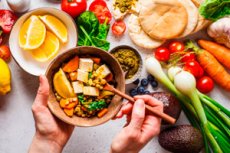New publications
Not All Plant Foods Are Created Equal: Lessons for Living a Long, Active Life
Last reviewed: 18.08.2025

All iLive content is medically reviewed or fact checked to ensure as much factual accuracy as possible.
We have strict sourcing guidelines and only link to reputable media sites, academic research institutions and, whenever possible, medically peer reviewed studies. Note that the numbers in parentheses ([1], [2], etc.) are clickable links to these studies.
If you feel that any of our content is inaccurate, out-of-date, or otherwise questionable, please select it and press Ctrl + Enter.

A new study on diet and aging in older Chinese people found that vegetarians were less likely to age “healthily” than omnivores, with vegans showing the worst association. The quality of the plant foods mattered: high-quality plant foods narrowed the gap with omnivores. The results were presented as an abstract in Current Developments in Nutrition and are detailed in the full-text article in npj Aging.
Background
Why test “vegetarianism ↔ healthy aging” at all?
In the elderly, it is critical not only what we exclude, but also what we replace it with: a deficiency of protein and individual micronutrients accelerates sarcopenia, cognitive and functional losses - these are the components of the “healthy aging” outcome in the Chinese CLHLS cohort and in the npj Aging work.
The quality of the plant-based diet is a key moderator.
Studies distinguish between healthy and unhealthy plant-based diets using the hPDI/uPDI indices: in the hPDI, “plus” is given to whole grains, vegetables/fruits, legumes, nuts, oils, tea/coffee; in the uPDI, “plus” is given to refined grains, sweet drinks, desserts, etc. It is the low quality (high uPDI, low hPDI) that is more often associated with adverse outcomes.
Protein: the norms for 60+ are higher than usual.
PROT-AGE/ESPEN consensus recommends ≈1.0–1.2 g protein/kg/day for the elderly (higher during illness/rehabilitation and during strength training) — below these levels, the risk of losing muscle mass and function increases. Therefore, the “plant base” for the elderly should be rich in protein (legumes/soy products, nuts/seeds) and distributed among meals.
Critical Nutrients on Strict Plant-Based Diets.
- B12: absorption from food decreases in the elderly; risk profile is high in vegans/vegetarians → fortified foods or supplements are indicated.
- Omega-3 EPA/DHA: Conversion of ALA from plants to EPA/DHA is limited (single percentages), so in fish-free seniors it makes sense to consider microalgae-DHA/EPA.
- Calcium/vitamin D, iron, iodine, and zinc also require attention, especially with the “UPDI” type of diet (refined and low in whole foods).
What have the Chinese data already shown?
In the npj Aging CLHLS, vegetarian patterns were associated with lower odds of “healthy aging,” especially when the quality of plant-based diets was low (high uPDI/low hPDI). Similar signals were observed for frailty in the same database, highlighting the role of nutrient quality and sufficiency. The links are observational (causality not proven), but the direction for prevention is clear: plant-based, yes, but high-quality and well-balanced.
How it was studied
- Who and how many: 2,888 healthy elderly participants at baseline from the Chinese National Longitudinal Study (CLHLS); median follow-up ~6 years.
- Diet types: 4 patterns were identified by frequency of food consumption: vegan, ovo-vegetarian, pesco-vegetarian, and omnivorous. Additionally, the quality of the plant-based diet was assessed using the hPDI (healthy plant-based foods) and uPDI (less healthy) indices.
- What is “healthy aging”: living to at least 80 years of age without major chronic diseases and without deterioration of physical, cognitive and mental functions.
The main results
- Compared with omnivores, vegetarians were less likely to achieve “healthy aging”: adjusted odds ratio 0.65 (95% CI: 0.47–0.89). For vegans, it was even lower: 0.43 (0.21–0.89).
- In a breakdown of components, vegetarians who lived to age 80 were more likely to have major chronic diseases, limitations in physical function, and cognitive impairment.
- The quality of the diet is critical: with a healthier plant-based diet, there is virtually no difference in the overall outcome from omnivores; with a less healthy diet, the risks of unfavorable components increase.
Why might this be?
Older adults are at higher risk for deficiencies in protein, B12, calcium, iron, omega-3, as well as sarcopenia and bone loss. Strict plant-based diets without thoughtful adjustments to these nutrients can impair muscle strength, bone, and cognitive function, which directly affects the criteria for “healthy aging.”
Important Disclaimers
- This is an observational study: association ≠ causation; there may be residual confounding by lifestyle factors.
- Nutrition assessment - shortened frequency FFQ, no portions; food details may be lost in subgroups.
- The results apply to the Chinese elderly population - the question of transferability to other countries and dietary systems is open.
Practical sense (if you are 60+)
- Not an anti-plant agenda. The point is that in old age, a plant-based diet should be high-quality: enough protein (1.0–1.2 g/kg/day as a guideline), sources of B12 (a supplement is a must if you are vegan), calcium, iron/iodine/selenium, omega-3 (ALA + EPA/DHA if necessary).
- Flexible patterns (pesco- or ovo-vegetarian) can be a practical compromise, reducing the risk of deficiencies and maintaining muscle/bone.
- It is worth discussing with a doctor/nutritionist about deficiency screening and a correction plan, especially if severely restricted. These recommendations echo the findings of reviews on optimal dietary patterns for healthy aging: plant-based + moderate inclusion of “healthy” animal products.
Source: Abstract Current Developments in Nutrition (May 2025) and full-text article npj Aging with detailed methods and figures. DOI: 10.1016/j.cdnut.2025.106050
